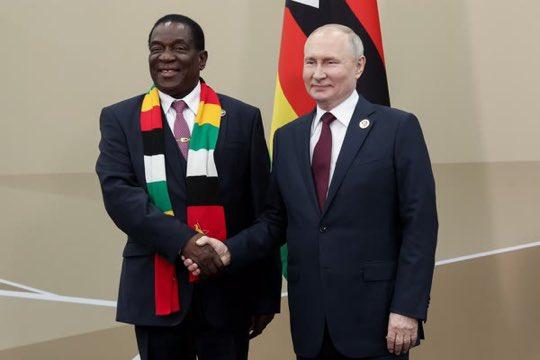News / National
Russia open doors to Zimbabwean construction workers
22 Nov 2024 at 14:44hrs |
0 Views

Russia and Zimbabwe have initiated talks to facilitate the deployment of Zimbabwean workers to Russia, particularly in the construction sector.
Russian Deputy Housing and Construction Minister Nikita Stasishin recently met Zimbabwe's Housing Minister Zhemu Soda during the World Urban Forum in Cairo to explore the possibility of Zimbabweans filling labor gaps in Russian construction. According to The Herald, the two officials agreed on a follow-up visit by a Russian delegation to discuss concrete proposals.
The labor shortage is a significant challenge for Russia's economy, which is under strain due to the war and an aging, declining population. President Vladimir Putin acknowledged the issue during a speech at the Valdai Discussion Club in Sochi on November 7, calling it "one of the main obstacles to our economic growth."
"We need 250,000 people in manufacturing industry right now, and it would not cover all its needs either," Putin said, highlighting the severity of the problem across various sectors.
The Russian government has been actively recruiting workers globally, especially in Africa and Asia. Job advertisements for Russian vacancies in fields such as IT and construction have surged in African nations. For instance, Kenya saw a dramatic increase in ads, from 161 in the first half of 2023 to nearly 6,500 in the same period this year, as reported by the Kyiv Independent.
However, the global recruitment drive has raised concerns. Instances of foreign workers being drawn into Russia's war effort—directly or indirectly—have led to cautionary measures in several countries.
In March, India's Central Bureau of Investigation revealed 35 cases of Indian nationals being lured to fight in Ukraine under the guise of job opportunities in Russia, with at least two confirmed dead in combat. Similarly, Nepal banned its citizens from working in Russia or Ukraine earlier this year after 10 young men were killed, and dozens more went missing, many while serving in the Russian military, according to The Guardian.
Critics warn that sending Zimbabwean workers to Russia could expose them to similar risks. Human rights advocates have called for transparency and safeguards to ensure the safety of those who might accept employment offers.
While the talks remain preliminary, they underscore Russia's pressing need for labor and its increasing outreach to developing nations to address the shortfall. For Zimbabwe, the proposal could offer economic opportunities, but it also raises questions about worker protection and ethical recruitment practices.
Russian Deputy Housing and Construction Minister Nikita Stasishin recently met Zimbabwe's Housing Minister Zhemu Soda during the World Urban Forum in Cairo to explore the possibility of Zimbabweans filling labor gaps in Russian construction. According to The Herald, the two officials agreed on a follow-up visit by a Russian delegation to discuss concrete proposals.
The labor shortage is a significant challenge for Russia's economy, which is under strain due to the war and an aging, declining population. President Vladimir Putin acknowledged the issue during a speech at the Valdai Discussion Club in Sochi on November 7, calling it "one of the main obstacles to our economic growth."
"We need 250,000 people in manufacturing industry right now, and it would not cover all its needs either," Putin said, highlighting the severity of the problem across various sectors.
The Russian government has been actively recruiting workers globally, especially in Africa and Asia. Job advertisements for Russian vacancies in fields such as IT and construction have surged in African nations. For instance, Kenya saw a dramatic increase in ads, from 161 in the first half of 2023 to nearly 6,500 in the same period this year, as reported by the Kyiv Independent.
However, the global recruitment drive has raised concerns. Instances of foreign workers being drawn into Russia's war effort—directly or indirectly—have led to cautionary measures in several countries.
In March, India's Central Bureau of Investigation revealed 35 cases of Indian nationals being lured to fight in Ukraine under the guise of job opportunities in Russia, with at least two confirmed dead in combat. Similarly, Nepal banned its citizens from working in Russia or Ukraine earlier this year after 10 young men were killed, and dozens more went missing, many while serving in the Russian military, according to The Guardian.
Critics warn that sending Zimbabwean workers to Russia could expose them to similar risks. Human rights advocates have called for transparency and safeguards to ensure the safety of those who might accept employment offers.
While the talks remain preliminary, they underscore Russia's pressing need for labor and its increasing outreach to developing nations to address the shortfall. For Zimbabwe, the proposal could offer economic opportunities, but it also raises questions about worker protection and ethical recruitment practices.
Source - Global Construction Review
Join the discussion
Loading comments…





































